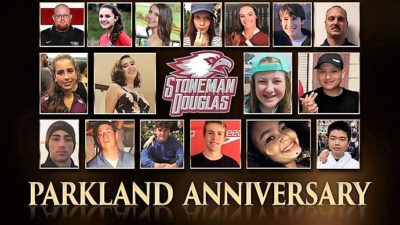The Marjory Stoneman Douglas High School massacre a year ago renewed the national debate on guns and school safety, turned some victims’ parents and surviving students into political activists and at least temporarily ended the local sheriff’s career.
But Thursday’s anniversary will primarily be about remembering the 14 students and three staff members who died in the third high-profile mass shooting in Florida since 2016. An interfaith service will be held at a Parkland park, near the school, to remember the victims.
Many Stoneman Douglas students arrived on campus Thursday wearing headphones and the burgundy #MSDStrong T-shirts that have become an emblem of the tragedy.
Outside the school, angel stakes for each of the 17 victims bordered the school’s landscaped sign. While absenteeism was expected to be high Thursday, freshman Matthew Sabia said he attended to show support and participate in activities.
“I want to show respect to what happened. The students who were here are probably sad and don’t want to think too much about it. We don’t really talk about it,” he said.
Classes were almost over last Valentine’s Day when authorities say a 19-year-old former student arrived on campus and began shooting. The rampage left 14 students and three school staffers dead.
Jogger Kara Cannizzaro stopped Thursday morning to pray at the memorial outside the school. She says “every single person of the community has been affected by this.”
Students also will perform service projects and observe a moment of silence and a non-denominational, temporary temple will open in neighboring Coral Springs for people to pay their respects. The structure will later be burned in a purification ceremony. Security throughout the community and at schools will be high.
“We don’t need (the anniversary) to remind us what happened. We live with it every day,” said businessman Andrew Pollack, whose 18-year-old daughter Meadow died in the attack. He met with President Donald Trump at the White House after the shooting and became an adviser to Gov. Ron DeSantis and his predecessor, Rick Scott. Other fathers like Fred Guttenberg and Manuel Oliver have become active in Democratic politics.
And victims’ relatives from both sides helped lead the successful push to remove Broward County Sheriff Scott Israel. DeSantis suspended the Democratic sheriff last month, citing incompetence in his handling of the shooting. Israel is fighting the suspension in the state Senate and says he will try to win back the office in next year’s election.
The massacre also led some Stoneman Douglas students to form the group “March for Our Lives,” which holds rallies nationwide calling for tougher gun regulations and toured the country registering young adults to vote.
“It was the kids themselves that made Parkland an unusual shooting,” said Adam Winkler, a professor at the University of California Los Angeles School of Law and gun rights expert. Just in Florida, 49 people died in the 2016 Pulse nightclub shooting in Orlando and five died at Fort Lauderdale’s airport in 2017. There have been other notable mass shootings across the country during that period — at a Las Vegas concert, a Pittsburgh synagogue and a Texas high school. But none resonated politically like Stoneman Douglas.
“What we haven’t seen is a mobilization of the students in quite the same way,” Winkler said.
But Thursday will be mostly a day to push aside politics. Victims’ families who have spoken publicly say they will spend the day quietly, visiting their loved one’s grave or participating in low-key events like a community walk.




